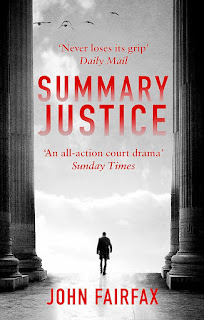Summary Justice - John Fairfax
That might not matter so much if Summary Justice can begin its series with a thrilling case that introduces an unlikely criminal case team that will take on and win what seems to be impossible cases. It certainly starts out that way at least with its ambiguous characterisation of William Benson. Benson has served 11 years for murder, a murder evidently that he maintains he did not commit. His own experience and a few words from a junior councillor Tess de Vere, encourages him to take up studies in law while he is in prison. In order to be permitted these kind of privileges however, and to even have a chance of getting out of prison to practice law, he has to plead guilty to the charge of murder against him.
That solves one problem, but evidently it creates another barrier that is surely insurmountable, since the legal profession is hardly likely to welcome a convicted murderer to the Bar. Against the odds however, Benson however achieves the near impossible and gets the necessary qualifications while serving his sentence. Gaining acceptance from the legal profession, attracting clients and getting forgiveness from the family of the young man he admitted killing is going to be much harder. Benson has some support and sympathy however from an anonymous sponsor who clearly believes he has 'great expectations', and from the person who originally inspired him to set off down the legal path and who believes in rehabilitation, Tess de Vere.
Allowing that there is potential for this team arrangement, even if in reality the hints of romantic attraction feel rather awkward, it's going to be Benson's first major case at the Old Bailey that is going to establish his credentials and set the tone for the series, and it's a murder case. Benson has a lot to prove, particularly when the legal profession won't support him, the press are against him and dangerous figures assault him on the street at night. Even Tess starts to have her doubts about her original assessment of the man. Benson has been asked to defend a woman who claims that she has been wrongly accused of murder, even though all the evidence points to her guilt. There are a lot of similarities to Benson's own case, and Tess wonders whether the identification with the woman's situation isn't leading him to be mistaken in presuming her innocence, and indeed whether she was right to believe in his claims of his own innocence.
There's potential there in the set-up and the case and with Fairfax's background in law you expect it to be handled with a degree of authenticity, but the execution is unfortunately somewhat lacking in Summary Justice. You get all the back and forth swaying of public opinion as the Prosecution and Defence alternately get the upper hand. New witnesses bring new revelations, some of them casting suspicion and doubt on Benson's past as much as his client. While this adds to the complications of proving her innocence, ultimately the secrets and background details really have very little relevance to the case, which when you get to the truth of it, proves to be a rather straightforward and mundane, and yet also not entirely convincing.
It's the courtroom drama itself however that is most lacking. You expect of course the pleasure of seeing an unreliable witness demolished by a good defending barrister, and Benson delivers this. It's made to look much too easy though, with witnesses and expert testimony being all to ready to own up to the flaws in their evidence, with no fear of being reprimanded for lying under oath, even when their own version of events can't really be disproved. "Ah, I might have been wrong in that", they seem to capitulate on the first challenge of their account, "Thank you for correcting me. I completely withdraw my evidence".
What surprises me most about the writing of John Fairfax however is that it is written under pseudonym for an author I rate very highly for his books as William Brodrick. Before he was a barrister, Brodrick was a monk and his Father Amselm novels (starting with The Sixth Lamentation) are deep explorations into historical crimes and mysteries that manage to touch deeply on spiritual and moral questions relating to the human soul when subject to exceptional pressures. There's little of that in evidence in Summary Justice. The first Benson and De Vere case might be a little bland and mainstream leaning by comparison, but it doesn't cheat the reader with outlandish revelations and twists, and it does manage to set up a new direction that could yet lead somewhere more interesting.




Comments
Post a Comment